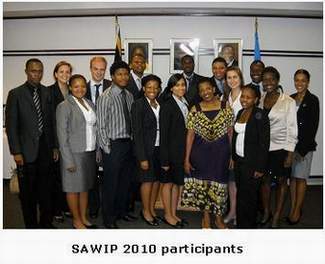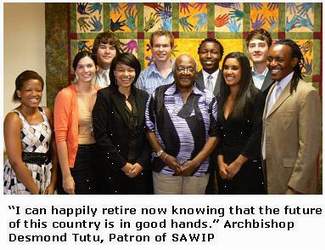 ReConnect Africa is a unique website and online magazine for the African professional in the Diaspora. Packed with
essential information about careers, business and jobs, ReConnect Africa keeps you connected to the best of Africa.
ReConnect Africa is a unique website and online magazine for the African professional in the Diaspora. Packed with
essential information about careers, business and jobs, ReConnect Africa keeps you connected to the best of Africa.


 The South Africa-Washington Internship Programme is helping to inspire, prepare and support new generations of leaders for South Africa.
The South Africa-Washington Internship Programme is helping to inspire, prepare and support new generations of leaders for South Africa.SAWIP is a non-profit youth leadership and service programme that recruits exceptional university students who have a record of leadership and service. It is an extension of the successful 15 year old Washington-Ireland Programme for Service and Leadership (WIP) which was initiated in 2006.
At an event held in South Africa House in London to raise awareness of the programme, successful SAWIP Interns talked about the benefits of the programme and how it has refocused their efforts to give back to South Africa.
SAWIP has a vision of a South Africa with strong leaders who have a global perspective and who serve others with humility and integrity and, in so doing, inspire future generations to do the same.
Starting as a pilot in 2007, the SAWIP programme has now been entrenched and is playing a vital role in bringing students from diverse backgrounds, with differing opinions, to participate in a leadership programme which spans six months. During this time they develop a deeper understanding of leadership for service, sharpening their communication, public speaking and critical thinking skills.
Each year SAWIP selects 15 or so diverse students from universities across South Africa for the leadership programme. Over the course of the programme, they find the prejudices that they have grown up with are broken down, enabling them to lead in society in a way that transcends cultural barriers.
SAWIP enables students from South Africa to undergo professional work experience internships in Washington DC at some of the most prestigious institutions, including congressional offices, government departments, non-profit orgnisations and business and diplomatic offices. During these internships students work in highly competitive environments, learning skills to help equip them as future leaders within South Africa.
Community service is also heavily emphasised in order to promote active citizenship and students are required to perform 30 hours of individual community service with a project of their choice both prior to leaving for Washington DC and as part of a SAWIP team project on their return home.
"Our lives were inexplicably changed and deeply impacted by this programme," said Emma Margetts, an alumnus of the 2009 programme who spoke of her experience with SAWIP.
An intensive and rigorous selection process was followed by the six month leadership programme which included two months in Washington. Living with a host family also helped to extend her cultural education.
As part of an alumni network that continues to lead through service, SAWIP participants are "bonded for life", said Margetts, in a group that transcends racial and socio-economic boundaries. Instead there is only one denominator – passion, with a commitment and drive for the betterment of the country.
"I am more proudly South African today than I have ever been," she says. Instead of thinking of money as the problem, change has to come from within, from our human capital, she added, "and that is exactly what SAWIP is."
"All of us are committed to Project South Africa," said Sabelo Mcinziba, another 2009 SAWIP alumnus.
 "As a young nation recovering from a long history of racial conflict, we would be profoundly mistaken to think that a political victory is enough for us to unwind the damage of apartheid," he said.
"As a young nation recovering from a long history of racial conflict, we would be profoundly mistaken to think that a political victory is enough for us to unwind the damage of apartheid," he said.
Mcinziba spoke of the need for a psychological transformation within South Africa, given the deeply entrenched separation, fear and misunderstanding of each other that apartheid engendered.
"In South Africa we know of each other, but we know each other on a very limited basis," he explained. "If we merely tolerate people, we have no time to love them."
SAWIP, he said, employs a simple but far from simplistic approach by making students learn through exposure to people and places they would otherwise not have come across. These encounters challenge them to think differently, not only of others but also of themselves; for as they get to know others, they also get to know themselves.
"All the clouds of separation that engulf us in South Africa fall away."
"Looking at South Africa from the outside, you start seeing that the way out is not too difficult," he observed.
On his return from Washington, Mcinziba gained an internship in the South African parliament serving with the Africa Desk in the International Relations Unit, and is clear about the requirements of a SAWIP alumni.
"The South Africa part of the programme is a programme for life in that we have to demonstrate what we mean by a post-SAWIP family. We don't talk change; we do change. Change is most effective when it begins in the mind; not by tolerance, but by love and understanding."
